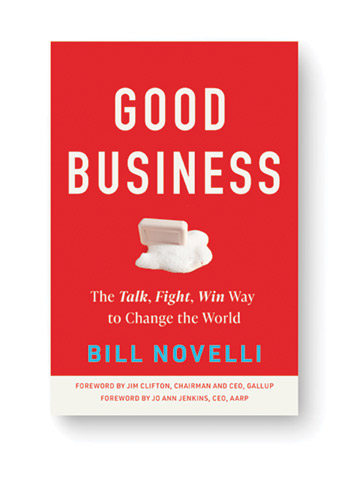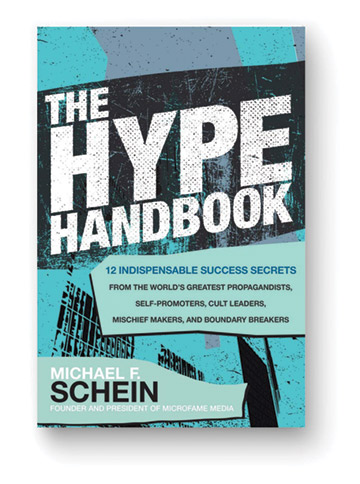Righteous commerce and holy hype.
By Dennis Drabelle

By Bill Novelli C’63 ASC’64
Johns Hopkins University Press, 368 pages, $27.95
Sixteen years ago, I profiled Bill Novelli C’63 ASC’64 for this magazine [“Gray Is Good,” Sep|Oct 2005]. But only now, after reading Novelli’s new book, Good Business, do I fully appreciate what I took for granted then: his smarts and sanity.
Before writing about Novelli, I had once represented a federal agency on a task force whose chairman, the CEO of a Fortune 500 company, invariably said “antidote” when he meant “anecdote,” as in “Let me illustrate that point with an antidote.” I’d also worked for a boss who couldn’t get through the weekly staff meeting without humiliating at least one of his underlings.
In contrast, the CEO of AARP (as Novelli then was) spoke impeccable English, treated his subordinates as partners in problem-solving, and made sure that meetings ended with everyone aware of who would do what to achieve the desired goal. Good Business—a blend of autobiography and plea for corporations to have and heed a conscience—evokes the Novellian drive, clarity, and respect for coworkers that this reviewer didn’t make enough of in 2005.
The accent in the book’s title should be on Good. Novelli got his first taste of working for public betterment when he joined the Peace Corps in 1970, though not as a volunteer. Novelli’s remit was to market the agency, and in doing so he ascertained what worried volunteers the most when their two-year stint ended: not whether they would fit in back home or find a job there, but the possibility that “sand would blow over their tracks and … all their hard work in the country where they had served would disappear.”
Novelli moved on to generate commercials for the reelection of Richard Nixon, and although his outfit was not technically part of the infamous CREEP (Committee to Re-elect the President), the two entities worked together. A cynic might jump to the conclusion that Novelli has spent most of his subsequent career at nonprofits to atone for that proximity to burglary and coverups. But he portrays himself as a lifelong centrist, and before challenging that claim, you might want to consider his takedown of market-worshiping economist Milton Friedman, bombastic novelist Ayn Rand, and other apostles of every-man-for-himself capitalism. “No law mandates that shareholder interests supersede the long-term health of a company,” Novelli writes in Good Business. Not only that, but “doing well by doing good actually accomplishes what Friedman advocates—increase profits.”
As cofounder of a public relations firm, Novelli spent several years in his own corner of the private sector; eventually, however, he gravitated back to public but nongovernmental service. After serving as acting CEO of CARE, a humanitarian organization, he accepted an offer to lead a campaign against tobacco ads pitched to kids. His account of this effort makes for the longest episode in the book, and Novelli is rightfully proud of the successes, including the euthanasia of Joe Camel, who embodied the alleged coolness of smoking in ads for Camel cigarettes. It took years—and Novelli had moved on to lead AARP by the time it was over—but the campaign paved the way for the Family Smoking Prevention and Tobacco Control Act of 2009 and contributed heavily to the transformation of smoking from a sign of sophistication to a mark of pitiable addiction.
Now approaching 80, Novelli teaches at Georgetown, where he started Business for Impact, a university center devoted to the principle that building “social and environmental strategies into [a firm’s] core business can improve financial performance as well as create greater good for … society as a whole.”

By Michael F. Schein C’99
McGraw Hill Education, 224 pages, $28
Michael F. Schein C’99 shares Novelli’s disdain for Ayn Rand. In his Hype Handbook, Schein confesses to an early infatuation with Rand’s didactic novel The Fountainhead, followed by a grownup realization of “how little her characters resemble any human beings I have actually encountered.”
Yet Schein does not shy away from citing charlatans and rogues as exemplars of effective hype. Take Madame Helena Blavatsky, who got rich and famous by inventing a religion called Theosophy and pushing it in a bible of her own making, the exotic-sounding Isis Unveiled. You might want to do something similar, Schein suggests—not necessarily founding a cult but selling your product or service by creating a matrix for it. As an example, he cites the sports promoter Mark McCormack, who did well for himself by whipping up “a comprehensive system of player rankings” for the game of golf.
Many of the case studies Schein presents seem to rely more on clever sloganeering or strategic grandstanding than on “hype,” with its connotation of exaggeration to the point of overkill. While reading the book, I kept thinking of a song from the musical Gypsy, in which young Gypsy Rose Lee’s fellow stripteasers teach her that “You Gotta Get a Gimmick” to differentiate yourself and succeed. That’s essentially the Schein approach.
Toward the end of his book, Schein acknowledges that its appeal may be strongest for a certain type of reader. It’s pretty easy, he writes, for those who “grow up with the right educational opportunities, right background, right interests, right personality, and right race … to make [their] way in the world using tried-and-true channels.” For those not so blessed, however, “creating a life full of opportunity requires more unconventional methods,” many of which fall into the category of hype.
That’s refreshingly honest, and it should be noted that not even the well-favored Bill Novelli has been above resorting to hype-ish tactics. When Novelli and his anti-smoking colleagues decided to go after chewing tobacco, too, they restyled it “spit tobacco.”
Dennis Drabelle G’66 L’69 has a new book coming out this fall: The Power of Scenery: Frederick Law Olmsted and the Origin of National Parks.




